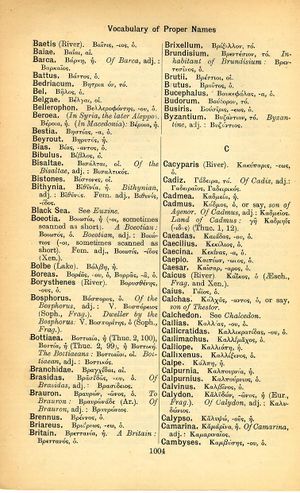Baetis
Ἀναξαγόρας δύο ἔλεγε διδασκαλίας εἶναι θανάτου, τόν τε πρὸ τοῦ γενέσθαι χρόνον καὶ τὸν ὕπνον → Anaxagoras used to say that we have two teachers for death: the time before we were born and sleep | Anaxagoras said that there are two rehearsals for death: the time before being born and sleep
English > Greek (Woodhouse)
(River) Βαῖτις, -ιος ὁ.
Latin > English (Lewis & Short)
Baetis: (Bĕtis, Paul. Nol. Carm. ad Aus. 10, 236), is, m. (acc. Baetin, Plin. 3, 1, 3, § 12 (al. Baetim); Mart. 9, 62, 2; Claud. Fesc. 12, 31; Mall. Theod. 285; Claud. Laud. Stil. 2, 238:
I BAETEM, Inscr. Grut. 153, 4; abl. Baete, Liv. 28, 22, 1: Baeti (al. Baete), Plin. 3, 1, 3, § 13; Amm. 23, 6, 21), = Βαῖτις, a river in Southern Spain, called by the inhabitants Certis, now Guadalquivir, Liv. 28, 16, 2; Mel. 3, 1, 5; Plin. 3, 1, 3, §§ 7 and 13.—
II Deriv.: Baetĭcus, a, um, adj., on or belonging to the Bœtis: provincia, Tac. H. 1, 53: regiones, Col. 1, pr. 20: vocabulum, id. 5, 1, 5: oves, id. 7, 2, 4: lana, Mart. 12, 65, 4; Juv. 12, 40.—
B Subst.: Baetĭca, ae, f., = Βαιτική, the province of Bœtica, lying on the Bœtis, in Southern Spain, distinguished for its excellent wool, now Andalusia and a part of Granada, Mel. 2, 6, 3; 2, 4, 7; 3, 1, 6; 3, 6, 1; Plin. 3, 1, 3, § 7; 11, 37, 76, § 196; Tac. H. 1, 78 al.—Hence,
2 Adj.: Baetica lana, Plin. 8, 48, 73, § 191: lacernae, made of the Bœtican wool, Mart. 14, 133.—Baetĭci, ōrum, m., the inhabitants of Bœtica, Plin. Ep. 1, 7.

